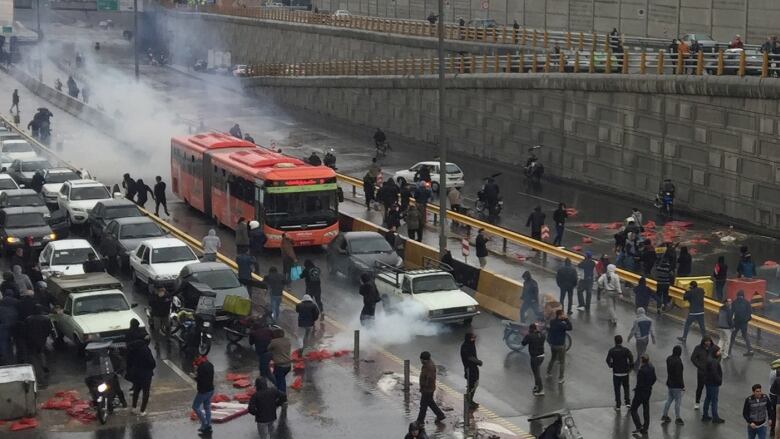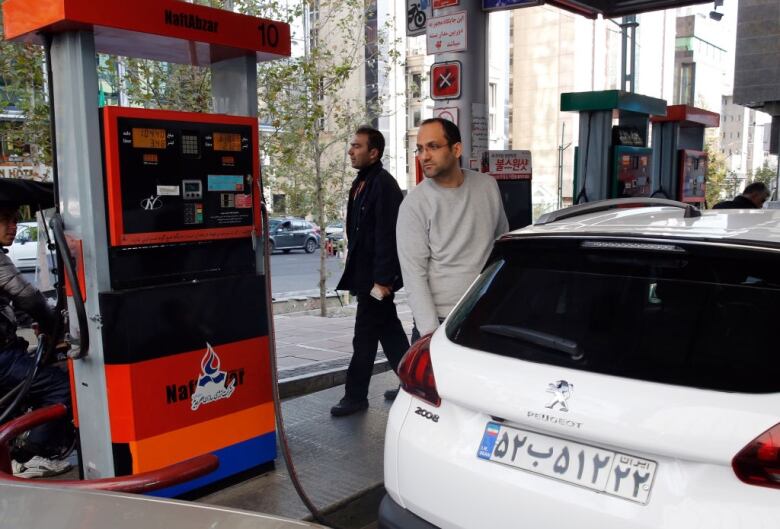One killed in Iran protests against fuel price hike
Price of regular gasoline rises 50% while monthly ration is set at 60 litres

Protesters angered by Iran raising government-set gasoline prices by 50 per centblocked traffic in major cities and occasionally clashed with police Saturday after a night of demonstrations punctuated by gunfire, in violence that reportedly killed at least one person.
The protests put renewed pressure on Iran's government as it struggles to overcome the U.S. sanctions strangling the country after President Donald Trump unilaterally withdrew America from Tehran's nuclear deal with world powers.
Though largely peaceful, demonstrations devolved into violence in several instances, with online videos purporting to show police officers firing tear gas at protesters and mobs setting fires. While representing a political risk for President Hassan Rouhani ahead of February parliamentary elections, it also shows the widespread anger among Iran's 80 million people who have seen their savings evaporate amid scarce jobs and the national rial currency's collapse.
The demonstrations took place in over a dozen cities in the hours following Rouhani's decision at midnight Friday to cut gasoline subsidies to fund handouts for Iran's poor. Gasoline in the country still remains among the cheapest in the world, with the new prices jumping to a minimum of 15,000 rials per litre of gas 50 per centup from the day before. That's 17cents (Cdn) more, making a litre cost 60 cents (Cdn).
Price increase expected for months
But in a nation where many get by as informal taxi drivers, cheap gasoline is considered a birthright. Iran is home to the world's fourth-largest crude oil reserves. While expected for months, the decision still caught many by surprise and sparked immediate demonstrations overnight.
Violence broke out Friday night in Sirjan, a city some 800 kilometres southeast of Tehran. The state-run IRNA news agency said "protesters tried to set fire to the oil depot, but they were stopped by police." It did not elaborate, but online videos circulating on Iranian social media purported to show a fire at the depot as sirens wailed in the background. Another showed a large crowd shouting: "Rouhani, shame on you! Leave the country alone!"
Mohammad Mahmoudabadi, an interior ministry official in Sirjan, later told state television that police and demonstrators exchanged gunfire, wounding several. He said many protesters were peaceful, but later masked men armed with guns and knives infiltrated the demonstration.

"They insisted on reaching the oil depot and creating crises," Mahmoudabadi said.
The semi-official ISNA news agency later quoted Mahmoudabadi as saying the violence killed one person.
In Iran's oil-rich Khuzestan province, online videos purported to show police firing tear gas on crowds. The province's city of Khorramshahr also saw gunfire, as could be heard in a brief clip played on air by state television. The region has long been a political tinderbox, with its ethnic Arab population that feels disenfranchised from the country's Persian-language majority.

Saturday morning, the start of the Iranian workweek, saw protesters stop cars on major roadways across the capital, Tehran. Peaceful protesters blocked traffic on Tehran's Imam Ali Highway, calling for police to join them as the season's first snow fell, according to online videos. A dump truck later dropped bricks on the roadway to cheers.
A large crowd in the city of Kermanshah demonstrated and later drew tear gas fire from police, a video showed. Others reportedly clashed in Tabriz, another major Iranian city. The online videos corresponded to Associated Press reporting on the protest.
Kermanshah, W #Iran
clashes between security forces and protesters. #IranProtests pic.twitter.com/bvhUsxNLQD
—@IranNWSuch protests require prior approval from Iran's Interior Ministry, though authorities routinely allow small-scale demonstrations over economic issues, especially as the country has struggled with currency devaluation.
It wasn't immediately clear if police made arrests. Iranian state television aired a segment Friday night trying to dispute the claims of opposition satellite news channels about the protests, calling their videos of demonstrations "fake news" in English. Demonstrators in many online videos Saturday began identifying the time and place in response.
Internet disruptions
Iranian internet access meanwhile saw disruptions and outages Friday night into Saturday, suggesting "a response to limit attendance and media coverage of the protests," according to the group NetBlocks, which monitors worldwide internet access.
Protester chants mirrored many from the late 2017 economic protests, which resulted in nearly 5,000 reported arrests and at least 25 people being killed. Some criticized Iran's spending abroad on Palestinians and others while the country's people remain poor. Protests, meanwhile, continue in Iraq and Lebanon, two Mideast nations home to Iranian proxies and crucial to Tehran's influence abroad.
Henry Rome, an analyst at the Eurasia Group, said that after mass protests, Rouhani was forced to back down from a 2017 plan to increase fuel prices by 50 per cent.
"The government was clearly attuned to this risk: The latest announcement was made in the middle of the night before a weekend," Rome said. "It took effect immediately, and it was announced without direct consultation with lawmakers."












_(720p).jpg)


 OFFICIAL HD MUSIC VIDEO.jpg)
.jpg)



























































































